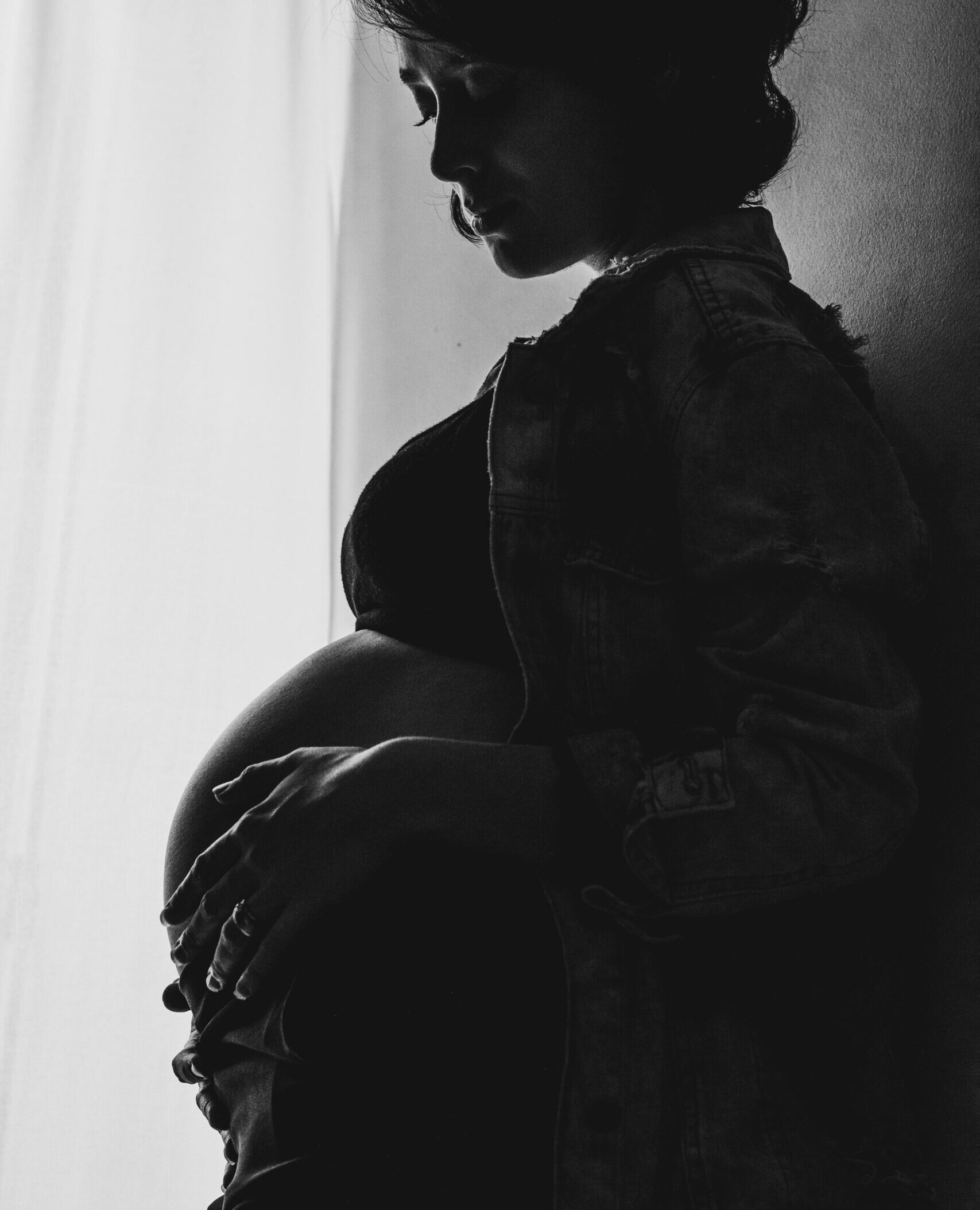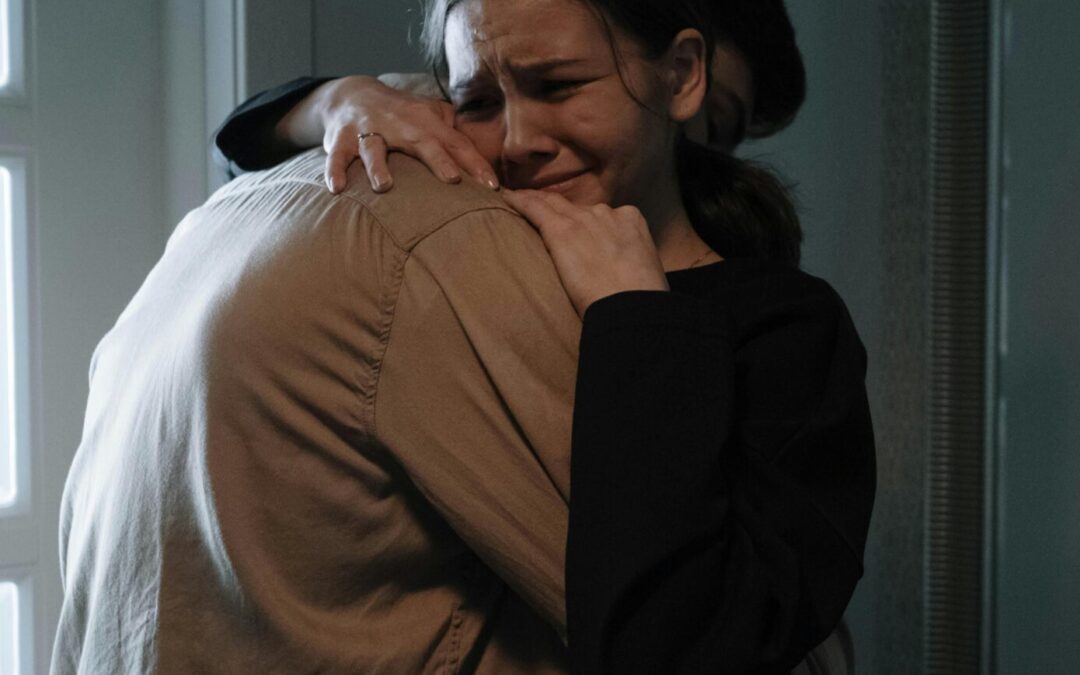our blogs
Current Post

Triplets Pregnancy Story
Ginger Wilczak,
Case Manager, Insight Clinical Counseling and Wellness, LLC
Two bubbles were immediately visible on the screen. “Is that… Is that twins?” I asked.
“No…” the doctor responded, “because there’s number three. It’s triplets!”
“Oh god… we’re gonna have to buy a minivan…”
The news that we were having triplets brought us so much joy. We already had a two-year-old daughter and had always said we wanted four kids, so this was perfect. We settled in and began to plan. Our families rallied around us, and we had faith that we could make it through.
But before the triplets came, I had to make it through a grueling pregnancy. Nothing about it was easy. (Did I honestly think it would be?) I was working from home on a grant at the time, which was a blessing, since the morning sickness was brutal and lasted all day. And when I tell you I got big, I mean I got big. Huge. Enormous.
Some of the pregnancy was fun. I enjoyed telling people I was pregnant with triplets because the look on their face was always amusing to me. It was usually a mix of astonishment and pity… mixed with relief that it wasn’t them. I also enjoyed the baby shower, which netted me 500 diapers (that were subsequently gone within the first 6 weeks after the birth of the babies…).
And everyone wanted to tell me how very blessed I was… How lucky we were… How special our situation was… How we should be so very happy…
If that were so, then, my question was, why wasn’t I feeling it? Why was I feeling so bad?
Situationally, there were things happening that were causing stress. I mean, I was pregnant with triplets for goodness sake. As well, I was working on that grant which needed to be completed by June 30th of the next year, and my due date was June 16. Of course, there was no way I was going full term, so it was even more important that I get the work done to be prepared for any contingency. We had two major trips during the pregnancy – one to Texas for Christmas and one to Grenada for a wedding in January. That translated to plane trips at three and four months pregnant. And I had a major family crisis in my extended family that may have led to early labor pains. I was overwhelmed. But it was more than that…
I was blue. No, I was sad. Unhappy. Downright depressed. The exact opposite of how I was supposed to be feeling. The joy and anticipation that were there at the beginning of my pregnancy, soon became less and less noticeable to me.
I first noticed the shift in my mood during the trip to Texas for Christmas. Because of the crisis in my family, this was a particularly stressful trip. On the plane ride home, I began to feel as though my head was swelling. My body began to vibrate. I broke out in a sweat and felt as though I could not catch my breath. I had to get out. In my giant pregnant condition, I climbed over my husband and child and began to run down the aisle of the plane repeating, “I gotta get out of here…” The flight attendants and air marshal escorted me to the back of the plane and helped to calm me. I heard someone say, “Ma’am, you’re having a panic attack.” After I returned to my seat, I remember thinking, Terrific… I’m pregnant and crazy. Yeah, I am going to be great at this…
Two weeks after this trip, we were back on a plane to go to Grenada for my brother-in-law’s wedding. Being in paradise was nice, and I feel like I enjoyed the trip. But I also remember spending an awful lot of that time crying. Crying over anything and everything. Crying over nothing.
In February, the family crisis reached a boiling point, and I felt a twinge. It was nothing really. Until it became something. And then the bed rest began. For three weeks, I tried to follow the doctor’s orders. But it just was not an easy thing to do with a two-year-old under foot. Then the twinge came back. So, off to the hospital we went again.
This time, the doctor said, “You come in with one baby and a twinge, you go home. You come with two babies, maybe you go home. You come with three babies… you do not go home.”
And so began my eight weeks stay in the hospital in the high-risk pregnancy wing, praying that one day I would get to hear them play the lullaby three times over the loudspeaker when my babies were born instead of silence…
I was fortunate that I came in at just the right time and got a corner room with a private bathroom. Life was not all bad. Around lunch, my mom would bring my daughter to visit and stay until my husband came at dinner time. Grace and I would spend the day together playing and decorating the room. I must have taken us through five or six packs of construction paper as we created a world of colors and shapes on the walls and hanging from the ceiling.
In the evening, Grace would get a bath and get ready for bed. Then, as she would leave, I’d say, “I’ll dream about you, you dream about me…” and she would reply, “I’ll see you in our dreams…” Yes, it was that cheesy and that cute.
But again, as tender and sweet as these moments were with my daughter and as convenient as it was that I was able to continue to work from my hospital bed, and as much as things in my family were working out ok in the end, the dread and depression continued. There were moments that were so bad that I wondered what it would feel like to set myself free by leaping from the 7th floor window…
At one point, the doctor came to ask why I was crying every day. The nurses had ratted me out. I explained that I was not able to have control over anything in my life. I could not control my body, I was not able to take care of my child, I was not able to do my job as well as I would have liked, someone else was taking care of my home… I had no control. He said he understood and that the hormones were likely influencing my emotions. Then, despite my objections (I did not want any additional medications in my system), he prescribed me the little pink pill.
Then one morning at 5 AM, my overhead light flicked on, and a psychiatrist began introducing himself as I groggily pulled myself from a deep sleep. Apparently, it was the best possible time to do a psych eval. I curtly explained, again, why I was feeling out of control. When I finished my story, he responded, without a hint of empathy, “That makes sense.” Then he told me to keep taking the little pink pill and walked out… leaving the light on.
I got out of bed, went to the door and whipped it open to the full view of the nurse’s station. “Don’t you ever let that man in my room again!” I said as I realized he was sitting at a computer working on notes. I straightened myself, turned around and waddled back into my room with as much dignity as I could muster. And that was that!
Time went on and I soon found myself at 32 weeks and 5 days. After dinner one Friday evening, I told my husband something did not feel right. About 24 hours later, on April 26, 2003, Stanley was born at 5:29, Daniel at 5:30 and Joseph at 5:31 PM.
I had finally done it, and I did not die! What’s more? I got to hear the lullabys playing three times over the loudspeakers at the hospital to signify the babies had been born. My victory songs!
But the blues weren’t over yet. That night, I dreamt that I had been plunged into a body of water and all I could think was that I cheated because I did not carry the boys for at least 34 weeks. To say I was overwhelmed at the time was an understatement.
The next day, I was ready to go home. The boys were in the NICU and I hated to leave them, but we had plans to stagger visits throughout the day so that they had us with them as much as possible. It was finally time. Until it wasn’t….
I began to have loss of sight in my peripheral vision. At first it happened for a few minutes. Then it lasted for about a half an hour, so I thought I better ask about it before I left. Before I knew it, a neurological resident was telling me that I would need to spend another night in the hospital so that I could undergo a CT scan and an MRI. I could not handle the news and broke down. And I mean, I broke down. The resident looked at me with horror on his face as I crumbled to the bed. I will admit, it was a bit dramatic, but look… it had been eight long weeks.
The next day, the neurologist and the resident came to give me the results. The neurologist looked at the chart and said, “Wow! You have been here a long time. No wonder you cried.” No wonder, indeed…
I had been having hormone migraines caused by the sudden decrease in hormones. It was the hormones. Again. What more could they do to me? Do not be fooled about the effects that hormones can have on your body, both physically and psychologically during pregnancy. They can be major and life altering.
At last, it was time to go home. As I was being discharged, my doctor, with a little joke about me being a difficult patient because I resisted it in the first place, told me he was taking me off the little pink pill. No time to wean. Just not prescribing it anymore. And with that, I went home to prepare to care for a two-year-old and three newborns.
Now, I had the continued letdown of hormones and withdrawal from an antidepressant that led to feelings of disorientation and depression. I do not mean disorientation as in not knowing where I was or anything like that. I mean disorientation in that my reality had shifted so dramatically both physically and psychologically from the beginning of pregnancy on, and I was overwhelmed to a degree I had never experienced before. I had a good partner and lots of family support, so I was fortunate in my mental health struggles; I was not alone. But feeling a mix of joy and sadness at the same time is a confusing paradox.
The sad fact is that between 10% and 20% of women experience perinatal depression and about 13% experience postpartum depression overall.
The whys of this depression include numerous factors like the hormone fluctuations that I mentioned earlier. But the most important thing to remember is that it is not your fault, and it is not because of anything you are doing wrong. The guilt of feeling bad when you are expected to feel so good is a heavy burden to bear.
In the end, however, the “whys” do not matter as much as the “what to do’s.” And there are several things you can do to lessen the symptoms that go along with perinatal depression.
Number one, is to be your own advocate and demand the right kind of help. Do not let anyone, not even a doctor, make you feel like you are wrong to feel the way you are feeling. Do not let anyone diminish the feelings you are having. Not everyone understands what it is like to have these feelings during pregnancy, and it is the kind of thing where you don’t fully get it until you get it….
What I did not receive, that would have been super helpful, was therapy. I do not understand why such an issue was made about my constant crying, but never once was I given a listening and empathetic ear. Validation? Yes. Empathy and support? Not really. Instead, I was given a little pink pill, to what? Shut me up? Medication is not a magic fix. Without additional help, its effectiveness is limited. I cannot stress enough how important it is to use that medication in combination with a therapy regimen. Therapy is valuable in helping to process emotions, feelings and thoughts while providing tools to deal with them. Medication can only take us so far.
Another important aspect of care is the physical. Our bodies go through so much as we create a tiny human, and proper nutrition and prenatal care is an absolute necessity. A healthy diet is crucial to regulating mood and emotions. As well, prenatal care ensures that any issues are caught in a timely manner. It can also help identify any mental health issues the mother may be having to help her receive the help and support she needs.
Exercise is also essential (as approved by your physician). I can personally attest that during my worst depression, walking was one of the tools that I used to bring myself out of it. The first day, I could not even make it to the end of the block. Soon, I was up to a mile a day, and it became a necessary meditative and relaxing activity.
I also like journaling to deal with depression. It is a way to track your experiences, which is cool during pregnancy; but it is also a way to track your moods and express your feelings, thoughts, and emotions without fear of judgement. Have a little fun with it. Use stickers and colored pens. If you are not feeling like writing, get creative. My daughter once cleaned out her purse and used all the scraps from the bottom to make a collage. It was really neat when it was finished, and it was full of memories.
One way or another, track your moods daily. Whatever this looks like for you. After a long and difficult mental health journey, (a story for another time), I received a diagnosis of bipolar disorder at the age of 50. Since then, with the help of therapy and medication, I have been able to be in recovery for a full three years with no manic or depressive symptoms. I know this because I track myself every day on a scale I created. In fact, if you look in my calendar, you will see a number from 1 to 5 on each day. 1 is depressed for more than two weeks with no situational explanation. 2 is depressed but situationally caused. 3 is even and that is the sweet spot. I shoot for a 3 every day. A 4 is situationally elated for less than two weeks. And 5 is manic, which can display itself in several ways. Tracking my mood has helped me to recognize when I needed to get in to see my therapist before our next scheduled appointment to head off issues. It also helps to validate that I am doing well.
Doing crafts is another way to deal with negative emotions. Expressing yourself creatively can be very therapeutic because it allows you to channel emotions, while also providing a distraction. In my hospital room, there was barely an inch of wall that was not covered with a construction paper tree, sun, flower, star, bunny, heart or…. you get the point. We also played with play dough and did other crafts. I was doing these things to entertain a young child while staying in bed, but they were also very calming activities in which to engage.
Practice gratitude. One of the best ways to bring yourself out of a depression is to focus on those things for which to be grateful. This one can be tricky when you are dealing with perinatal depression. There is so much guilt that is experienced by a depressed pregnant woman who is constantly being reminded of all the things for which she should be grateful. However, practicing gratitude makes changes in the brain that bring about happiness. If it is too overwhelming to focus on ALL the good things, focus on one thing at a time and meditate on your gratitude for that.
Meditation is another wonderful way to deal with depression. Along those lines, prayer can be immensely powerful in bringing about peace, depending on your beliefs.
Finally, when possible, allow music and laughter into your life. Do not hide from it. Embrace it. Music can have a profound effect on mood. And laughter is an amazing way to release dopamine and serotonin in the brain.
If you are suffering from depression while pregnant or after the birth of your child, I feel you. I see you. I know your pain. And I can promise that there is a light on the other side of this darkness. It’s not just about the birth of your child. It’s about being able to regain control of your body and mind. Seek the help and show yourself some grace. Godspeed on the journey of your lifetime.
Latest Posts

Coercive Control: The Hidden Domestic Violence
When most people hear about intimate partner violence (IPV), thoughts of physical abuse usually come to mind. However, another insidious form of abuse, coercive control, is often overlooked since the scars are not always visible. Some coercive controllers are physically violent, while others are not.

You Don’t Have to be a Monk to ‘Meditate’
So many of my clients have shared with me that meditation (mindfulness) coping skills ‘Don’t work for me!’ or ‘They make my anxiety worse!’ or ‘I could never sit and think about nothing!’ Maybe you can relate? For most of us, when we think of meditating, we think of a monk sitting cross legged on the floor experiencing a state of quiet and focus. Honestly, that’s what comes to my mind too.

Secondary Infertility
Two years after our first child, my husband and I felt we were ready to add another to our family. Little did we know the second time around would be a very different experience. Long before trying for our second child, I recall having read an article about secondary infertility. It stuck with me, even though it wasn’t my reality yet. Secondary infertility is the inability to conceive or carry a baby to term after previously giving birth.
Our Locations
Request Appointment
Contact

Copyright © 2025 Insight Clinical Counseling & Wellness, LLC. All Rights Reserved.

Our Locations
follow us
Instagram
Facebook
LinkedIn
